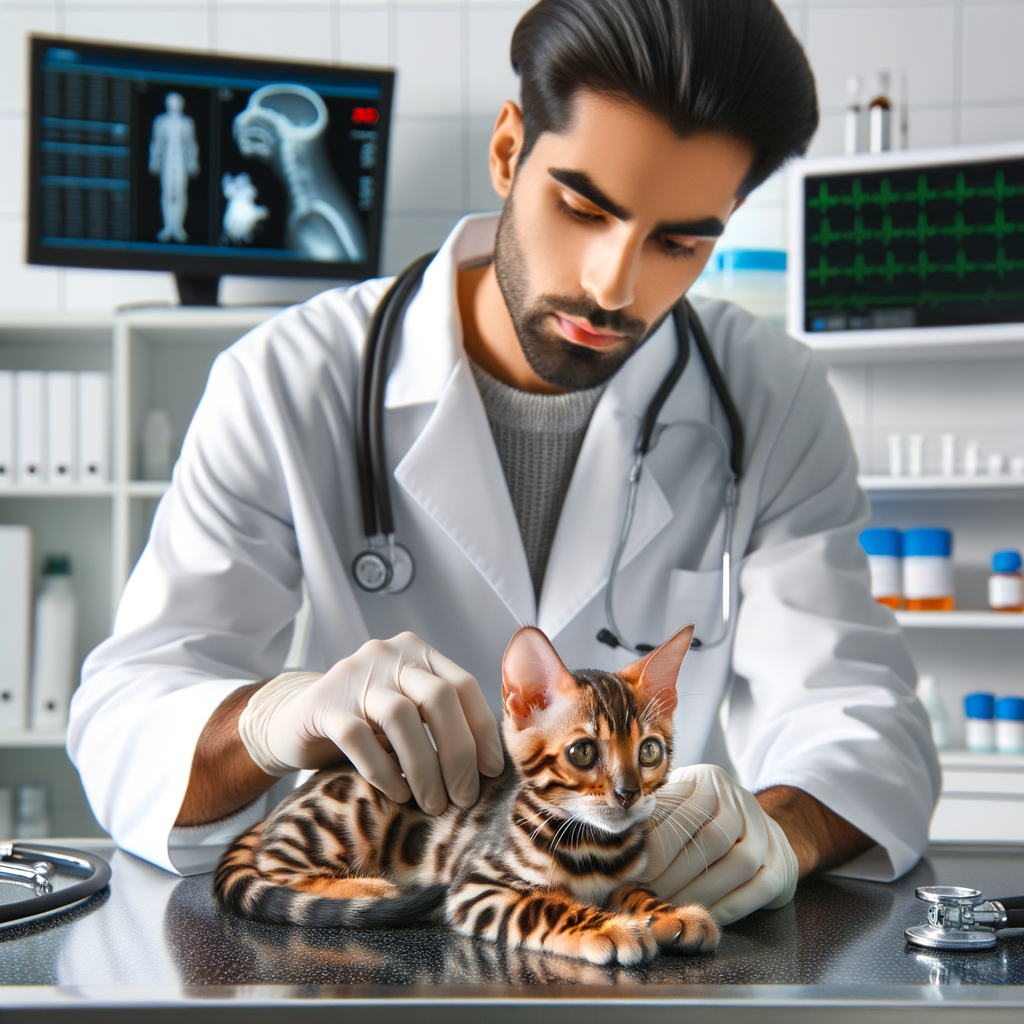
Introduction to Preparing Your Bengal Cat for Their First Vet Visit
One of the first steps in ensuring their health and well-being is taking them to their first vet visit. This visit is crucial for several reasons and will help set the foundation for your Bengal cat’s future health.
-
Importance of the first vet visit for a Bengal kitten:
- Early Health Assessment: The vet will check your kitten’s overall health and identify any potential issues early on.
- Vaccinations: Your Bengal kitten will receive necessary vaccinations to protect them from common feline diseases.
- Parasite Control: The vet will check for parasites and recommend treatments if needed.
- Building a Health Record: Starting a health record early helps track your kitten’s growth and medical history.
-
Overview of what to expect at a Bengal cat vet visit:
- Physical Examination: The vet will perform a thorough physical check-up, including examining the eyes, ears, mouth, and coat.
- Weight and Growth Monitoring: Your kitten will be weighed to ensure they are growing at a healthy rate.
- Discussion on Diet: The vet will provide guidance on the best diet for your Bengal kitten.
- Behavioral Advice: The vet may offer tips on managing common kitten behaviors and training.
- Q&A Session: This is a great opportunity to ask any questions you have about your Bengal kitten’s care.
Understanding Bengal Cat Health Check-Up
Bengal Cat Health Basics
-
Common health issues in Bengal cats:
Bengal cats are generally healthy, but they can be prone to certain health problems. Some common issues include hypertrophic cardiomyopathy (a heart condition), progressive retinal atrophy (an eye disorder), and hip dysplasia (a joint problem).
-
Importance of regular health check-ups for Bengal cats:
These visits help ensure your Bengal cat stays healthy and happy. According to the American Veterinary Medical Association, routine vet visits can prevent many health problems and extend your pet’s life.
What to Expect During a Bengal Cat Health Check-Up
-
Physical Examination
During a physical examination, the vet will check your Bengal cat from head to tail. They will look at the eyes, ears, nose, and mouth. The vet will also listen to the heart and lungs with a stethoscope. This helps to find any signs of illness or infection early.
For example, if your cat has red gums, it might mean they have gum disease. Catching this early can prevent more serious problems later.
-
Behavioral Assessment
The vet will also watch how your Bengal cat behaves. They will ask questions about your cat’s eating, sleeping, and playing habits. This helps the vet understand if your cat is happy and healthy.
For instance, if your cat is hiding a lot, it might be a sign they are stressed or in pain. The vet can give you tips on how to make your cat feel better.
-
Diagnostic Tests
Sometimes, the vet will need to do tests to check your cat’s health. These tests can include blood tests, urine tests, and X-rays. These tests help the vet find problems that can’t be seen during a physical exam.
For example, a blood test can show if your cat has an infection or a problem with their organs. Early detection can make treatment easier and more effective.
Preparing Bengal Cat for Vet Visit
Before the Visit
- How to prepare your Bengal cat for the vet visit:Start by getting your cat used to the carrier. Leave the carrier open in your home with a soft blanket inside. This helps your cat see it as a safe place.
Next, practice short car rides. This will help your cat get used to the motion and sounds of the car. Reward your cat with treats and praise after each ride.
Finally, gather all necessary documents. This includes your cat’s medical records and any notes about their health. Being organized will make the visit smoother.
- Tips for reducing stress before the visit:Try to keep your Bengal cat’s routine as normal as possible. Feed them at the usual times and play with them to burn off extra energy.
Use calming products if needed. There are sprays and diffusers designed to reduce cat anxiety. These can be found at pet stores or online.
On the day of the visit, stay calm yourself. Cats can pick up on your stress. Speak to your cat in a soothing voice and handle them gently.
During the Visit
- What to bring with youWhen taking your Bengal cat to the vet, make sure to bring the following items:
- Carrier: A secure and comfortable carrier for your cat.
- Medical Records: Any previous medical records or vaccination history.
- Favorite Toy or Blanket: Something familiar to help reduce stress.
- Treats: Small treats to reward your cat for good behavior.
Having these items will help ensure a smooth and stress-free visit for both you and your Bengal cat.
- How to behave during the visitKnow how to act during the vet visit to make it as easy as possible:
- Stay Calm: Your cat can sense your emotions. Staying calm will help keep your cat calm too.
- Be Patient: Vet visits can be stressful for cats. Give your Bengal time to adjust to the new environment.
- Follow Instructions: Listen to the vet’s instructions and follow them carefully.
- Ask Questions: If you have any concerns or questions, don’t hesitate to ask the vet.
By following these tips, you can help make the vet visit a positive experience for your Bengal cat.
After the Visit
- Post-visit care for your Bengal cat
After the vet visit, your Bengal cat may feel a bit stressed or tired. Make sure to provide a quiet and comfortable space for them to rest. Offer fresh water and their favorite food to help them relax. If your vet prescribed any medication, follow the instructions carefully.
Here are some tips for post-visit care:
-
-
- Keep an eye on their behavior for any signs of discomfort.
- Ensure they have a cozy place to sleep.
- Provide plenty of water and a balanced diet.
- Administer any prescribed medication as directed.
-
-
Monitoring your Bengal cat’s health after the visit
Watch for any changes in their eating habits, energy levels, or litter box use. If you notice anything unusual, contact your vet right away.
Here are some key things to monitor:
-
-
- Appetite: Are they eating more or less than usual?
- Energy: Are they more lethargic or hyperactive?
- Bathroom habits: Any changes in their litter box use?
- Behavior: Are they hiding or acting differently?
-
Keeping a close eye on these factors will help ensure your Bengal cat stays healthy and happy after their vet visit.
Bengal Cat Vaccination Schedule
-
Importance of Vaccinations for Bengal Cats
They help protect against serious diseases. Vaccines work by boosting your cat’s immune system. This makes it easier for them to fight off infections.
Without vaccines, Bengal cats can get very sick. Some diseases can even be fatal. Vaccinating your Bengal cat helps keep them safe and healthy.
-
Recommended Vaccination Schedule
Here is a typical schedule for Bengal cats:
Age Vaccine 6-8 weeks Feline Distemper (Panleukopenia), Rhinotracheitis, Calicivirus 12 weeks Rabies 16 weeks Booster for Feline Distemper, Rhinotracheitis, Calicivirus 1 year Booster for all previous vaccines Every 1-3 years Rabies and other boosters as recommended by your vet
Bengal Cat Wellness Exam
Understanding the Wellness Exam
- What is a wellness exam?
It helps ensure they are healthy and happy. During this exam, the vet checks your cat from head to tail. They look for any signs of illness or issues that might need attention.
- Why is it important for Bengal cats?
Bengal cats are known for their active and playful nature. Regular wellness exams are crucial to keep them in top shape. These exams help catch any health problems early. Early detection can make treatments easier and more effective.
What to Expect During a Wellness Exam
-
Physical examination:
During a wellness exam, the vet will check your Bengal cat’s body. They will look at the eyes, ears, teeth, and skin. The vet will also listen to the heart and lungs. This helps to find any health problems early.
-
Behavioral assessment:
The vet will observe how your Bengal cat behaves. They will ask questions about your cat’s habits at home. This helps to understand if there are any behavioral issues that need attention.
-
Preventive care recommendations:
The vet will give advice on how to keep your Bengal cat healthy. This can include tips on diet, exercise, and vaccinations.
Ensuring Quality Veterinary Care for Your Bengal Cat
-
Recap of Bengal cat first vet visit tips:
Taking your Bengal cat to the vet for the first time can be a smooth experience if you prepare well. Bring all necessary documents, such as vaccination records and any previous medical history. Make sure your cat is comfortable in their carrier and try to schedule the appointment at a time when your cat is usually calm.
-
Importance of regular vet visits for Bengal cat health:
These visits help in early detection of potential health issues, ensuring your cat stays healthy and happy. According to the American Veterinary Medical Association, cats should have a wellness exam at least once a year.
| Key Aspect | Details |
|---|---|
| First Vet Visit Tips | Bring documents, ensure comfort, schedule wisely |
| Regular Vet Visits | Annual wellness exams, early detection of issues |
Ensuring quality veterinary care for your Bengal cat is essential for their well-being. By following the tips for the first vet visit and understanding the importance of regular check-ups, you can help your Bengal cat live a long, healthy life.






